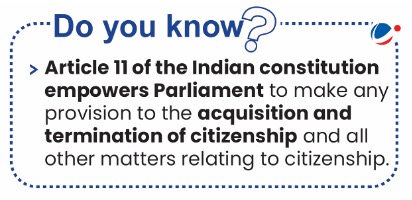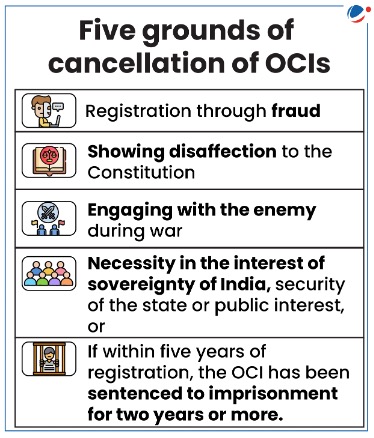Why in the news?
Ministry of Home Affairs has amended Citizenship Rules, 2009 and notified Citizenship (Amendment) Rules, 2024 to enforce the Citizenship Amendment Act (CAA), 2019.
Background
- By exercising power under Article 11, the Parliament passed CAA-2019 and received the President's assent in December 2019. However, the MHA had not frame the rules, so the Act could not be implemented.
- The CAA aims to give citizenship to the target group of migrants even if they do not have valid travel documents as mandated in The Citizenship Act, of 1955.

Citizenship Amendment Act (CAA), 2019
- The amendment provides that illegal migrants who fulfil four conditions will not be treated as illegal migrants under the Act. The conditions are:
- they are Hindus, Sikhs, Buddhists, Jains, Parsis or Christians
- they are from Afghanistan, Bangladesh or Pakistan they entered India on or before December 31, 2014
- they are not in certain tribal areas of Assam, Meghalaya, Mizoram, or Tripura included in the Sixth Schedule to the Constitution, or areas under the “Inner Line” permit, i.e., Arunachal Pradesh, Mizoram, and Nagaland.
- The Central Government exempted the said migrants from the adverse penal consequences of the Passport (Entry into India) Act, 1920 and the Foreigners Act, 1946 and rules or orders made thereunder.
- The period of naturalisation has been reduced from 11 years to 5 years for the above category of migrants.
- Five grounds for cancelling OCI registration: The Act provides that the central government may cancel the registration of OCIs.

Key highlights of Citizenship (Amendment) Rules, 2024
Eligibility |
|
Other Qualifications for citizenship by naturalization |
|
Proof of nationality |
|
Renouncing citizenship of another country |
|
Authority to which application may be made |
|
Need of CAA 2019 and Rules
- Human Rights Perspective: The Act upholds the principles of human rights by providing relief to persecutedindividuals and safeguarding their rights to life and liberty.
- Strengthening National Security: The Act is aimed at differentiating between illegal immigrants and persecuted minorities.
- Relief for Partition Victims: The Constitutions of Pakistan, Afghanistan and Bangladesh provide for a specific state religion. As a result, many persons belonging to Hindu, Sikh, Buddhist, Jain, Parsi and Christian communities have faced persecution on grounds of religion in those countries.
Concern Raised
- Classification of countries: Migrants from other neighbouring countries such as Sri Lanka (Buddhism is the state religion) and Myanmar (primacy to Buddhism) are not included.
- Basis of migration: There is no test stipulated under the CAA Rules, 2024 to prove or scrutinize if the applicant was compelled to enter India because they faced persecution or fear of persecution.
- Potential of violation of right to equality: The exclusion of Muslims, Jews and Atheists from CAA is said to be a violation of Article 14 and the principle of secularism of the constitution.
- Classification based on date of entry: CAA also offers differential treatment to migrants based on their date of entry into India, i.e., whether they entered India before or after December 31, 2014.
- Implication on external relations: The amendment may imply that religious persecution of the non-minority in neighbouring countries is one of the reasons for the amendment, potentially leading to tensions with neighbouring countries.
Conclusion
While the Constitutional Amendment Act aims to address the concerns of persecuted minorities, it is imperative to address the raised concerns to ensure a comprehensive and inclusive approach.





